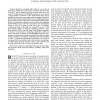Free Online Productivity Tools
i2Speak
i2Symbol
i2OCR
iTex2Img
iWeb2Print
iWeb2Shot
i2Type
iPdf2Split
iPdf2Merge
i2Bopomofo
i2Arabic
i2Style
i2Image
i2PDF
iLatex2Rtf
Sci2ools
132
click to vote
TNN
2011
2011
Minimum Complexity Echo State Network
—Reservoir computing (RC) refers to a new class of state-space models with a fixed state transition structure (the “reservoir”) and an adaptable readout form the state space. The reservoir is supposed to be sufficiently complex so as to capture a large number of features of the input stream that can be exploited by the reservoir-to-output readout mapping. The field of RC has been growing rapidly with many successful applications. However, RC has been criticized for not being principled enough. Reservoir construction is largely driven by a series of randomized model building stages, with both researchers and practitioners having to rely on a series of trials and errors. To initialize a systematic study of the field, we concentrate on one of the most popular classes of reservoir computing methods - Echo State Network (ESN) - and ask: What is the minimal complexity of reservoir construction for obtaining competitive models and what is the memory capacity of such simplified rese...
Related Content
| Added | 15 May 2011 |
| Updated | 15 May 2011 |
| Type | Journal |
| Year | 2011 |
| Where | TNN |
| Authors | Ali Rodan, Peter Tino |
Comments (0)

